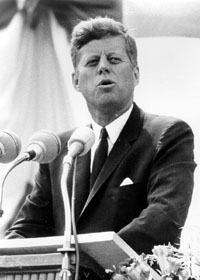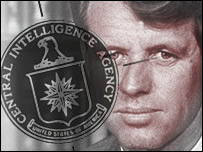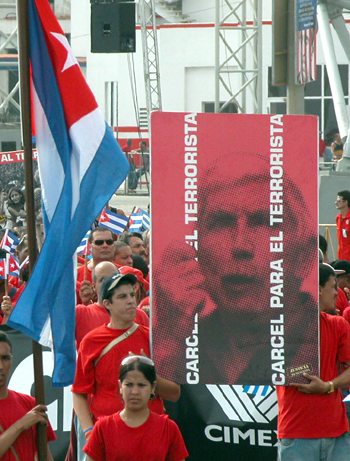The war in Iraq and the assassination of Kennedy
posted by F Espinoza | 12.12.2007 13:16 | Anti-militarism | Terror War



• Fidel Castro was probably the first person to understand and denounce the conspiracy involved • General Lemnitzer and other members of the Joint Chiefs of Staff were planning a coup against President Kennedy that culminated with the crime in Dallas
BY GABRIEL MOLINA
AT 44 years since the assassination of President John F. Kennedy, the war in Iraq and the Bush family saga have magnified the need to declassify documents related to the November 22, 1963 attack that affected not only the United States but, to a surprising degree, Cuba, and the rest of the world.
The day after the scandalous crime, President Fidel Castro was probably the first to denounce the assassination as conspiratorial when he appeared on Cuban television and described it as "highly prejudicial to the interests of humanity, to the interests of peace." Analysts noted the contrast, given that in the previous two years Cuba had suffered two military attacks directed by Kennedy: the October Missile Crisis of 1962 and the Bay of Pigs invasion in April 1961.
"We have been the victim of constant hostility on the part of the United States. Among those who govern and the men who run the country, Kennedy bore a significant responsibility for these acts," he said on November 23, 1963.
Nevertheless, he continued, "We can say that there are elements within the United States who are defending an ultra-reactionary policy in all spheres, internationally as well as internally… And those are the elements that look to benefit from the events that took place yesterday in the United States…"
Fidel outlined how Kennedy was being heavily attacked by the most reactionary circles with forceful campaigns, resolutions and proposed bills in Congress. The mass media expanded the attacks by pushing the government toward war, including before, during and after the October (Missile) Crisis. They criticized the positions Kennedy took nationally, especially his stance against discrimination and segregation and, internationally, mostly his policies vis-à-vis the Soviet Union and his new about-turn in relation to Cuba and Vietnam.
The Cuban president spoke at length about the recent attitude Kennedy had taken with respect to civil rights in the racial context. These positions unleashed powerful right-wing forces against the president and led many to believe "that the assassination of President Kennedy was the work of those opposed to his foreign policy." Kennedy had established a dialogue with Khrushchev on important issues, "i.e. his policy of a nuclear pact, his policy on Cuba – which they believed was not aggressive enough – a policy that they considered weak," and his legislation giving civil rights to African Americans, particularly in the south of the United States.
Fidel’s discussion of the theory of the lone gunman was no less insightful. Nobody at that time questioned that Oswald had acted alone, or his alleged "pro-Castro" sympathies. Five days later, November 27, speaking of the telescopic rifle that the authorities were saying Oswald used, the Cuban leader observed: "Once it has been fired, the target is lost and you have to find it again. With that type of weapon it is really very hard to fire three shots in a row but, above all, difficult to fire in that way at a target. It’s almost impossible."
Years later it was demonstrated with acoustic and graphic evidence that there had been more than one sniper.
The Cuban leader read the first tendentious news dispatch at 2:00pm: "… because, observe this: from the cable agencies there’s one that has been more moderate, more objective: the AP, and one that has been telling unrestrained barefaced lies, shamelessly promoting an anti-Cuba policy and defamation campaign, and that’s the UPI. ‘Dallas, November 22, UPI – The police today arrested Lee H. Oswald, identified as president of the Fair Play for Cuba Committee, as the prime suspect in the assassination of President Kennedy.’" Even today campaigns around the event are used by elements interested in redirecting suspicions away from those really responsible for the crime and in destroying the Cuban Revolution.
The seriousness of the situation has been revealed little by little since then. The latest details emerged this year with the publication of investigator David Talbot’s book Brothers: The Hidden History of the Kennedy Years, with its sensational revelation that Robert Kennedy was probably killed because he was convinced from the beginning that his brother’s assassination was the work of a conspiracy by those he had been working closely with against Fidel Castro, elements of the Central Intelligence Agency, the Italian-American mafia and Cuban gangsters. Although enraged by the events, Bobby Kennedy had remained silent because he understood the power he was up against, but a few days before his nomination as the Democratic candidate had been confirmed, he made the mistake of admitting that if he were elected president he would reopen the case.
Investigations into the Kennedy brothers’ close collaborators and certain previously declassified documents reveal that the joint chiefs of staff were about to effect a coup against President Kennedy, given the worsening confrontation that began in April of 1961 with the failed Bay of Pigs invasion.
On April 18, at midnight, a meeting took place in the White House, as the annual Congressional reception was ending, as requested by Richard Bissell, CIA assistant director. The military men invited, General Lemnitzer and Admiral Burke, wore their dress uniforms, while the civilians, Kennedy himself, McNamara, Johnson and Dean Rusk were formally dressed. Bissel presented a summary of the military situation and reported that a total defeat was imminent. He proposed as the only way to avoid certain defeat, in his judgment, a direct military intervention by the U.S. Armed Forces.
The president reminded them that he had stressed to them from the beginning and publicly stated that that would not happen. But both the Pentagon and CIA chiefs had not taken the warning seriously. The weak plan, an exact replay of the successful operation in Guatemala in 1954, devised and organized by the CIA of Allan Dulles via the same dirty works group: Tracy Barnes, David Atlee Phillips, Howard Hunt and David Sánchez Morales, was based on a plot to assassinate Fidel Castro and on military intervention.
Burke insisted and Kennedy, beginning to lose his patience, responded, "Burke, I don’t want to see the United States involved in this."
The admiral shouted back, "Hell, Mr. President, we are involved!"
He had already virtually assumed a position of insubordination, having told the Cuban recruits and their U.S. leaders: "Forces in the administration are trying to block the invasion. If these forces manage to block it, the leaders of the brigade should mutiny against their advisors and proceed with the invasion." This was later revealed in Haynes Johnson’s book Bay of Pigs. Additionally, on the first day, Burke had sent the aircraft carrier Essex and helicopters from the Boxer in close to the Cuban beaches, in violation of orders that they should remain at a distance of 50 miles from the coast. Kennedy did not let himself be intimidated. Three hours later, the meeting ended without him reversing his decision.
But this was only the beginning. The denouement came after Lemnitzer presented a macabre plot to do away with Fidel Castro, similar to the explosion aboard the U.S.S. Maine in 1898, used as a pretext for the U.S. intervention in Cuba. His Operation Northwoods included terrorizing Cuban exiles with bombs in Miami and even in Washington. The final blow would be the destruction of the Mercury spacecraft piloted by John Glenn, who completed the first U.S. orbit of the Earth. Another variant included the downing of a U.S. charter flight. "The plan alarmed McNamara and Kennedy, as it would inevitably mean the deaths of many U.S. citizens, civilian and military." The rejection of the plan was the last straw for Lemnitzer, who decided to participate in a conspiracy in which General Edwin Walker was involved, supported by the ultra-right organizations the John Birch Society and the Ku Klux Klan.
Lemnitzer was called to a meeting in the White House during March of 1962, as those close to the Kennedy brothers told Talbot, "The President had made a shocking discovery: his joint chiefs of staff were plotting to overthrow his government and install in its place an accursed military dictatorship like those in South America," in JFK’s words. He preferred not to publicly expose the plot in exchange for the general’s resignation.
The third round came with the October 1962 Missile Crisis, during which the President found himself virtually alone facing the joint chiefs of staff. Even Maxwell Taylor, appointed October 1, did not support him, although at least he did not take an aggressively offensive position, like those calling for aerial attacks on Cuba. The most bellicose was Curtis LeMay, who vehemently opposed the president’s plan of a naval blockade.
"It whiffs of the cowardice of Neville Chamberlain," groaned LeMay, "It would be almost as bad as the pacification of Munich." According to Talbot, the Air Force chief treated the president disrespectfully, trying to put him on the defensive, by reminding him of the accusations made against his father. Historians have attributed to Joe Kennedy, U.S. ambassador in London, the shameful position of having counseled Chamberlain to make concessions in order to pacify Hitler, which provoked President Roosevelt to replace him, even though he had placed Kennedy in London with the idea that his ambassador, being Irish, would not takes sides with the British.
No less aggressive was Admiral Anderson. Kennedy had told McNamara that, as secretary of defense, he was to strictly enforce the order that no U.S. forces could fire on Soviet ships without the president’s express consent. Admiral Anderson snubbed him by saying that the Navy had known how to manage a naval blockade since the days of the war of independence.
Among other challenges, on the civil rights front the situation was no less explosive. At midnight on September 30, 1962, a good part of the Kennedy cabinet was waiting anxiously for the outcome of the riot unleashed at the University of Mississippi when James Meredith attempted to register there and thus force the implementation of federal decrees mandating racial integration of schools across the country. White students, members of the Klan and neighbors had surrounded the building armed with bricks, picks and shotguns, trying to get to Meredith, yelling for his lynching. Dozens of police agents were trying to prevent the crime that the crowd was ready to commit.
Recognizing that the protection being provided was far too weak to face such a large, angry mob, Kennedy mobilized federal troops. Hours after the order, the military had yet to comply, resorting to a variety of pretexts, like difficulties involved in moving personnel from Memphis to Oxford. In reality, troops were being detained by the right-wing General Walter who was inciting the rioters.
President Kennedy, outraged as rarely before, had to speak by telephone directly to General Adams in order to have the forces finally arrive, past 2:00 in the morning. In the end two people were killed; 166 police agents were injured along with dozens of soldiers, students and other demonstrators; and there were 1, 300 arrests, including the insubordinate general.
Although the president retained a level of popularity, after the October Missile Crisis there was significant polarization within the country’s real economic, political and military powers, which even reached the point of Kennedy being branded a communist. They feared that the Kennedy brothers would attempt to seriously challenge the military-industrial complex and other powerful forces such as the oil companies, starting by ending the war in Vietnam.
When the news of the assassination arrived, Fidel was talking with French journalist Jean Daniel who had been charged by JFK with determining the Cuban leader’s reaction to secret meetings that were taking place in Washington to discuss the possibility of normalizing relations with Cuba – another move on the part of the president that had alienated the U.S. right wing. The Kennedys were attacking the philosophy of war that at that time was being projected most aggressively on Cuba and in Vietnam. According to Daniel, Fidel expressed his total condemnation of the assassination of someone who was becoming, on account of his challenges, the greatest U.S. president since Lincoln.
The Cuban leader’s analysis, based fundamentally on the motives for and methods used in the attack, has been confirmed over the years, most recently by Talbot’s investigation, which revealed that Kennedy sent a message to Soviet leaders letting them know that he and his brother Robert had been victims of an internal conspiracy. He mistrusted these forces, apparently, more than the Soviet Union. Fidel was deciphering JFK’s ideas reflected in Talbot’s book The Enemy Within.
On November 23, 1963, Fidel wrote that one of JFK’s errors in relation to Cuba was to have played into the hands of his enemies, as he did in 1961, by assuming the "invasion plans organized by the (previous) Republican administration… which used these as a political weapon against him."
Fidel was convinced that the military-industrial complex was the force behind the war in Vietnam, like the current occupation of Iraq. Anti-war sentiment in the United States is stymied now, even though the electorate has clearly demonstrated its desire to withdraw U.S. troops from that occupied country, but the overwhelming majority of politicians are attacking the losses produced by the war, but not its ignoble motives. They have not abandoned the philosophy of plunder that Fidel denounced before the United Nations in 1960.
Next year will be the 45th anniversary of the assassination of Kennedy. It is time to demand that U.S. authorities who replace Bush declassify secret CIA documents and reopen the investigation into this crime that was really a coup against humanity. "A macabre plan to implement a philosophy of war and aggression, to place the government of the United States at the mercy of the most aggressive circles of the monopolies, of imperialism and the worst agencies of the United States," as Fidel defined at the time. A plan to keep the war dogs occupied in Afghanistan and in Iraq.
Humanity must crush the philosophy of plunder, which is the philosophy of war.
NB: All quotes retranslated from the Spanish.
 http://www.granma.cu/ingles/2007/noviembre/vier30/48kennedy-i.html
http://www.granma.cu/ingles/2007/noviembre/vier30/48kennedy-i.html See also:
 http://www.gwu.edu/~nsarchiv/NSAEBB/NSAEBB103/index.htm
http://www.gwu.edu/~nsarchiv/NSAEBB/NSAEBB103/index.htm  http://www.gwu.edu/~nsarchiv/NSAEBB/NSAEBB153/
http://www.gwu.edu/~nsarchiv/NSAEBB/NSAEBB153/  http://www.gwu.edu/~nsarchiv
http://www.gwu.edu/~nsarchiv  http://www.gwu.edu/~nsarchiv/NSAEBB/NSAEBB222/index.htm
http://www.gwu.edu/~nsarchiv/NSAEBB/NSAEBB222/index.htm  http://www.granma.cu/ingles/posadacarriles.html
http://www.granma.cu/ingles/posadacarriles.html  http://www.freethefive.org
http://www.freethefive.org  http://www.antiterroristas.cu
http://www.antiterroristas.cu Videos:
"Mission against Terror":
 http://youtube.com/watch?v=CCdGdpeNps8
http://youtube.com/watch?v=CCdGdpeNps8  http://es.arcoiris.tv/modules.php?name=Unique&id=824
http://es.arcoiris.tv/modules.php?name=Unique&id=824 "Bacardí, the bat's secret":
 http://video.google.es/videoplay?docid=5416850335187952791
http://video.google.es/videoplay?docid=5416850335187952791  http://es.arcoiris.tv/modules.php?name=Downloads&d_op=v...ter=E
http://es.arcoiris.tv/modules.php?name=Downloads&d_op=v...ter=E
posted by F Espinoza
Comments
Display the following comment